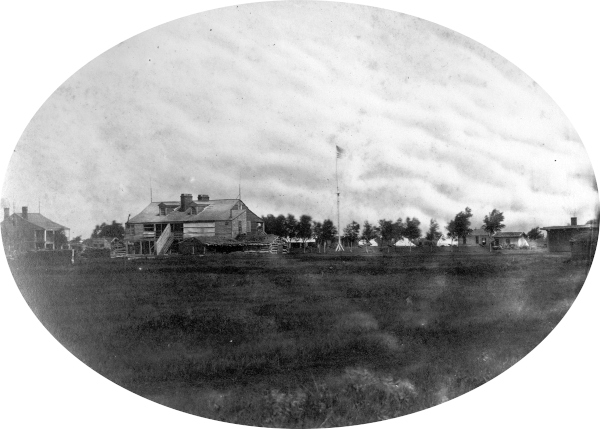From Burton:
After satisfying hunger with vile bread and viler coffee—how far from the little forty-berry cup of Egypt!—for which we paid 75 cents, we left Kearney Station without delay. Hugging the right bank of our strange river, at 8 A.M. we found ourselves at Fort Kearney, so called, as is the custom, after the gallant officer, now deceased, of that name.
Every square box or block house in these regions is a fort; no misnomer, however, can be more complete than the word applied to the military cantonments on the frontier. In former times the traders to whom these places mostly belonged erected quadrangles of sun dried brick with towers at the angles; their forts still appear in old books of travels: the War Department, however, has been sensible enough to remove them. The position chosen is a river bottom, where fuel, grass, and water are procurable. The quarters are of various styles; some, with low verandas, resemble Anglo-Indian bungalows or comfortable farm houses, others are the storied houses with the "stoop" or porch of the Eastern States in front, and low, long, peat-roofed tenements are used for magazines and out houses. The best material is brown adobe or unburnt brick; others are of timber, whitewashed and clean looking, with shingle roofs, glass windows, and gay green frames, -- that contrast of colors which New Englander loves. The habitations surround a cleared central space for parade and drill; the ground is denoted by the tall flag staff, which does not, as in English camps, distinguish quarters of the commanding officer. One side is occupied by officers' bungalows, the other, generally that opposite, by the adjutant's and quartermaster's offices, and the square is completed by low ranges of barrack and commissariat stores, whilst various little shops, stables, corrals for cattle, a chapel, perhaps an artillery park, and surely an ice-house -- in this point India is far behind the wilds of America -- complete the settlement. Had these cantonments a few more trees and a far more brilliant verdure, they would suggest the idea of an out station in Guzerat, the Deccan, or some similar Botany Bay for decayed gentlemen transport themselves.

We all prepared for the "gravity of the situation" by discharging and reloading our weapons, and bade adieu, about 9 30 AM, to Fort Kearney. Before dismissing the subject of forts, I am disposed to make some invidious remarks upon the army system of outposts in America . [See pages 41-43 of The City of the Saints]
.......